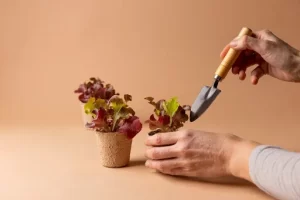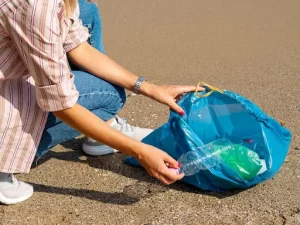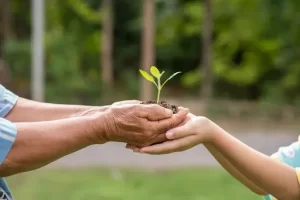Environmental sustainability doesn’t necessarily entail a life without comforts, despite what the hippies of the 1970s may have initially advocated. Instead, it involves being mindful of your resource consumption and reducing avoidable waste (food, energy, water, or plastic).
The fact is that every day, we make decisions that have an unintended impact on the environment, the climate, and animals. However, we can do a lot to lessen our environmental footprint, from our effort of recycling to avoiding purchasing more than we need.
How Can You Become More Sustainable Every day?
Sustainable living is a way of life, and there are many quick and simple methods to start being more environmentally conscious immediately. You can make tiny changes at first and gradually establish a sustainable lifestyle. Here are a few ways to live sustainably so that we can all try to improve the Earth for future generations.
1. Decrease your water usage.
Water conservation refers to using water resources sustainably and responsibly to meet the current and future needs of people and the environment. It involves adopting water-saving practices such as reducing water consumption, recycling and reusing wastewater, and using efficient water management technologies.
Water conservation is critical as the world’s freshwater supply is limited and unevenly distributed. According to The United Nations world water development report, only 2% of the planet’s freshwater supply is frozen in ice caps and glaciers, while 97.5% of the water on Earth is saltwater. Moreover, of the remaining freshwater, only a small portion is available for human consumption, making water conservation an essential step towards ensuring sustainable access to water for all.
By practising water conservation, we can reduce the pressure on our water resources and mitigate the impacts of water scarcity. In addition, it can help preserve the ecological balance of aquatic ecosystems, promote economic development, and enhance the quality of life for people worldwide. Water conservation is important for ensuring water availability for future generations and protecting the natural environment and biodiversity.
Here are some recommendations on how to reduce water waste:
- Turn off the water faucet as you wash your dishes and brush your teeth.
- Inspect the pipes and toilets for leaks.
- Use the washing machine only when fully loaded (this will also help with your energy consumption).
- Shorten your showers.
2. Don’t Waste Food
Food waste is a problem that has far-reaching consequences, affecting our economy, society, and the environment. When we waste food, we waste all the resources that go into producing, harvesting, processing, packaging, and transporting that food. This includes land, water, energy, and labour, all with high economic costs.
Furthermore, food waste has social implications, particularly in a world where millions go hungry daily. By wasting food, we are essentially throwing away the opportunity to feed people who are in need. This is morally reprehensible and a missed opportunity to examine one of the world’s most pressing issues.

Lastly, food waste also has environmental repercussions. When food is wasted, it often ends up in landfills, decomposing and producing methane, a potent greenhouse gas contributing to climate change. Food waste also contributes to deforestation, soil erosion, and water pollution, which can have long-term environmental impacts.
According to the Food and Agricultural Organization (FAO) of the United Nations, approximately one-third of all food produced for human consumption, or 1.3 billion tonnes, is wasted each year globally. This statistic is both staggering and alarming, and it highlights the urgent need for all of us to take action to reduce food waste and address this critical issue.
The following are helpful tips to stop food waste:
- Don’t throw away any leftovers you may have. Either freeze them or try to devour them before they spoil
- Fruits and vegetables should be frozen before they go bad
- Cook only as much as you will consume
- If you’re throwing a lot of food out at the end of the month, avoid purchasing foodstuffs
- Grow Your Food
Grow Your food” refers to cultivating and harvesting food crops in one’s garden or on a small farm rather than relying solely on store-bought produce. This revolutionary movement has been gaining momentum in recent years as people become more concerned about the sustainability and safety of the food supply.
There are many benefits to growing your food. For one, it gives you complete control over the quality and safety of the produce you consume. In addition, you can avoid pesticides and other harmful chemicals often used in commercial farming and ensure that your food is fresh and free from contamination.
Growing your food can also be a great way to save money. Once you’ve invested in the necessary equipment and seeds, you can produce a lot of food relatively cheaply. Plus, you can reduce your grocery bill by eating the food you’ve grown instead of buying expensive produce at the store.

In addition to the health and financial benefits, growing your food can be fun and rewarding. It allows you to connect with nature and gain a sense of accomplishment from nurturing and harvesting your crops. It can also be a great way to get kids involved in gardening and teach them where their food comes from.
Many different types of crops can be grown in a home garden or small farm, including vegetables, fruits, herbs, and even grains. The specific crops you choose will depend on your location, climate, and personal preferences.
Overall, the “Grow Your Own food” movement is a great way to take control of your food supply, save money, and enjoy the many benefits of gardening.
- Avoid Using Plastic
Plastic has become an ever-present part of our daily lives, and it seems it is here to stay. The material’s durability and versatility have made it a go-to choice for everything from packaging to construction. But unfortunately, our heavy reliance on plastic has come at a cost, and our oceans have borne the brunt of this impact.
It is estimated that roughly 40% of the ocean’s surface is covered in swirling convergences of plastic waste. These areas, known as “garbage patches,” are home to billions of pounds of discarded plastic, which can take hundreds of years to break down. The plastic waste that makes its way into our oceans is unsightly and poses a significant threat to marine life.

Animals can become entangled in plastic debris or mistake it for food, leading to injury, suffocation, and death.
Despite growing awareness of the problem, plastic production continues to increase, and our waste management infrastructure needs to catch up. As a result, we must reevaluate our relationship with this material to address the plastic crisis and find more sustainable alternatives. While plastic may be here to stay for the foreseeable future, we can still take action to mitigate its impact and work towards a more sustainable future.
With a few easy actions, you can start reducing your plastic waste:
- Use plasticfree, biodegradable products
- Replace to reusable kitchen towels and food wraps
- Wherever possible, avoid plastic packaging (e.g., select unwrapped produce at the grocery store, shop locally)
- Reduce Your Miles and Go Green
The phrase “Reduce Your Miles and Go Green” calls for individuals to adopt environmentally-friendly practices and reduce their carbon footprint. It suggests that by reducing the number of miles travelled, people can help to mitigate the negative impact of transportation on the environment.
One way to reduce your miles and go green is by using alternative modes of transportation such as walking, cycling, or taking public transport instead of driving a car. This reduces the number of miles travelled, air pollution, and road congestion.
Another way to reduce your miles and go green is carpooling or sharing a ride with others. This reduces the number of vehicles on the road, saves fuel, and reduces greenhouse gas emissions.

Furthermore, using fuel-efficient vehicles, such as electric or hybrid cars, can also reduce the miles travelled and the carbon footprint of transportation.
Overall, the phrase “Reduce Your Miles and Go Green” encourages individuals to take action towards a more sustainable future by adopting environmentally-friendly practices in their daily lives.
Every choice we make, including how we commute to work, where we shop, what we eat, and the items we use to keep our homes fresh and clean, provides an opportunity to act sustainably. As a result, your seemingly insignificant, minor activities will undoubtedly have a significant, long-lasting environmental impact.
Join the revolution with Odyana!!
Our conscious choice influences our day-to-day decisions and behaviour in numerous ways. Contact us to learn more.
